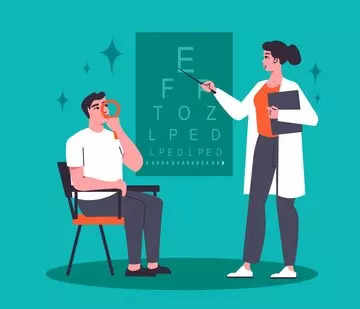In today's digital era, screen time has become an inevitable part of daily life, whether for work, entertainment, or socialising. However, prolonged exposure to digital screens can have serious implications for our eye health, particularly in increasing the risk of myopia, or nearsightedness. Myopia is a refractive error where distant objects appear blurry, and it has been steadily on the rise, especially among children and young adults. Thankfully, there are several proactive measures you can take to maintain eye health and prevent myopia.
1. Adopt the 20-20-20 Rule
One of the easiest ways to protect your eyes from screen-related strain is by following the 20-20-20 rule. For every 20 minutes of screen use, take a 20-second break and focus on something 20 feet away. This simple habit can help reduce digital eye strain and improve eye muscle relaxation. It prevents the eyes from becoming overworked, which can contribute to the development of myopia.
2. Ensure Proper Lighting
The lighting in your environment plays a crucial role in eye health. Poor lighting can force your eyes to work harder, leading to eye strain. When using screens, ensure the room is well-lit but avoid direct glare. Ambient lighting is ideal, and if you’re using a computer, consider investing in a screen filter or anti-glare glasses to reduce strain. Also, avoid using screens in total darkness, as this can cause discomfort and worsen the risk of eye problems.
3. Take Regular Outdoor Breaks
Spending time outdoors can significantly benefit eye health and reduce the risk of myopia. Studies have shown that children who spend more time outside in natural sunlight have a lower chance of developing myopia. Natural light helps the eyes focus on distant objects, promoting eye development. Aim for at least 1-2 hours of outdoor activity per day. It doesn't have to be strenuous—simply walking outside or playing can be enough to provide the benefits of natural light exposure.
4. Adjust Screen Settings for Comfort
A common cause of eye strain is improper screen settings. Brightness, contrast, and text size should all be adjusted to make viewing more comfortable. The screen should not be too bright compared to the surrounding environment, and text should be large enough to read without squinting. You can also activate blue light filters or use special glasses that reduce blue light exposure, which can cause additional strain on the eyes, especially in the evening.
5. Maintain a Healthy Diet
Nutritional choices also influence eye health. A diet rich in vitamins A, C, and E, along with omega-3 fatty acids, can help maintain strong vision and prevent conditions like myopia. Carrots, spinach, kale, and fish such as salmon and mackerel are excellent foods to include in your diet for maintaining eye health. Additionally, antioxidants found in fruits and vegetables can protect your eyes from oxidative stress, which can contribute to vision issues.
6. Monitor and Regulate Screen Time
While it's almost impossible to avoid screens altogether, managing screen time is key to preventing eye strain and the development of myopia. Set limits on screen time and ensure that breaks are taken regularly. For children, the American Academy of Paediatrics recommends no more than 1 to 2 hours of recreational screen time per day. In the case of adults, try to avoid long, uninterrupted sessions of screen use, particularly before bed, to give your eyes time to rest.
7. Use Correct Posture When Using Screens
Sitting posture plays an important role in reducing eye strain. Avoid leaning too close to your screen, as this can cause your eyes to over-focus and strain. Ideally, your screen should be positioned at eye level to maintain a neutral neck and head position, and the distance between you and the screen should be about an arm's length. Additionally, make sure to sit in a comfortable chair with proper lumbar support.
8. Get Regular Eye Check-ups
Regular eye examinations are essential in detecting early signs of myopia and other vision issues. Even if you don’t experience any immediate symptoms, scheduling an eye check-up once a year can help identify underlying problems. Early intervention can prevent the progression of myopia and ensure that corrective measures, such as glasses or contact lenses, are prescribed if necessary.
Preventing myopia in today's screen-heavy world requires a combination of lifestyle adjustments and proactive eye care practices. Simple steps such as adhering to the 20-20-20 rule, taking outdoor breaks, and ensuring proper screen settings can help mitigate eye strain and reduce the risk of myopia. Moreover, regular eye check-ups and a healthy diet play key roles in maintaining long-term eye health. By making these changes, you can help safeguard your vision for the future.
1. Adopt the 20-20-20 Rule
One of the easiest ways to protect your eyes from screen-related strain is by following the 20-20-20 rule. For every 20 minutes of screen use, take a 20-second break and focus on something 20 feet away. This simple habit can help reduce digital eye strain and improve eye muscle relaxation. It prevents the eyes from becoming overworked, which can contribute to the development of myopia.
2. Ensure Proper Lighting
The lighting in your environment plays a crucial role in eye health. Poor lighting can force your eyes to work harder, leading to eye strain. When using screens, ensure the room is well-lit but avoid direct glare. Ambient lighting is ideal, and if you’re using a computer, consider investing in a screen filter or anti-glare glasses to reduce strain. Also, avoid using screens in total darkness, as this can cause discomfort and worsen the risk of eye problems.
3. Take Regular Outdoor Breaks
Spending time outdoors can significantly benefit eye health and reduce the risk of myopia. Studies have shown that children who spend more time outside in natural sunlight have a lower chance of developing myopia. Natural light helps the eyes focus on distant objects, promoting eye development. Aim for at least 1-2 hours of outdoor activity per day. It doesn't have to be strenuous—simply walking outside or playing can be enough to provide the benefits of natural light exposure.
4. Adjust Screen Settings for Comfort
A common cause of eye strain is improper screen settings. Brightness, contrast, and text size should all be adjusted to make viewing more comfortable. The screen should not be too bright compared to the surrounding environment, and text should be large enough to read without squinting. You can also activate blue light filters or use special glasses that reduce blue light exposure, which can cause additional strain on the eyes, especially in the evening.
5. Maintain a Healthy Diet
Nutritional choices also influence eye health. A diet rich in vitamins A, C, and E, along with omega-3 fatty acids, can help maintain strong vision and prevent conditions like myopia. Carrots, spinach, kale, and fish such as salmon and mackerel are excellent foods to include in your diet for maintaining eye health. Additionally, antioxidants found in fruits and vegetables can protect your eyes from oxidative stress, which can contribute to vision issues.
6. Monitor and Regulate Screen Time
While it's almost impossible to avoid screens altogether, managing screen time is key to preventing eye strain and the development of myopia. Set limits on screen time and ensure that breaks are taken regularly. For children, the American Academy of Paediatrics recommends no more than 1 to 2 hours of recreational screen time per day. In the case of adults, try to avoid long, uninterrupted sessions of screen use, particularly before bed, to give your eyes time to rest.
7. Use Correct Posture When Using Screens
Sitting posture plays an important role in reducing eye strain. Avoid leaning too close to your screen, as this can cause your eyes to over-focus and strain. Ideally, your screen should be positioned at eye level to maintain a neutral neck and head position, and the distance between you and the screen should be about an arm's length. Additionally, make sure to sit in a comfortable chair with proper lumbar support.
8. Get Regular Eye Check-ups
Regular eye examinations are essential in detecting early signs of myopia and other vision issues. Even if you don’t experience any immediate symptoms, scheduling an eye check-up once a year can help identify underlying problems. Early intervention can prevent the progression of myopia and ensure that corrective measures, such as glasses or contact lenses, are prescribed if necessary.
Preventing myopia in today's screen-heavy world requires a combination of lifestyle adjustments and proactive eye care practices. Simple steps such as adhering to the 20-20-20 rule, taking outdoor breaks, and ensuring proper screen settings can help mitigate eye strain and reduce the risk of myopia. Moreover, regular eye check-ups and a healthy diet play key roles in maintaining long-term eye health. By making these changes, you can help safeguard your vision for the future.
You may also like

Haryana IPS officer Puran Kumar cremated after nine-day stalemate

Telangana Police arrest home guard, RMP doctor for rape, illegal abortion

Zubeen Garg case: Violence after supporters gather outside Assam jail, 5 accused sent to judicial custody - video

Delhi govt releases Rs 108 crore grant-in-aid for 12 govt colleges

Axis Bank's Q2 net profit falls 25 pc to Rs 5,557.5 crore







